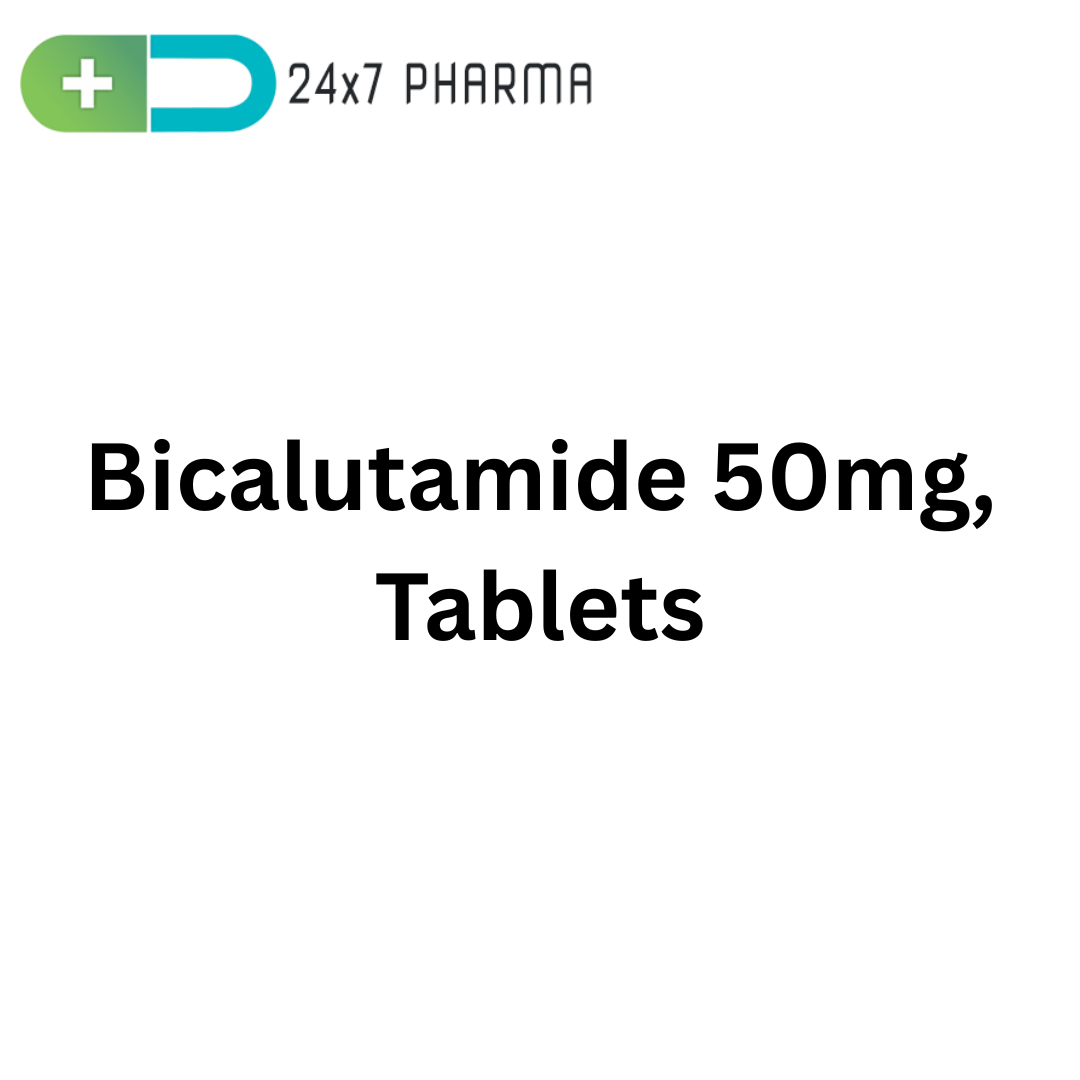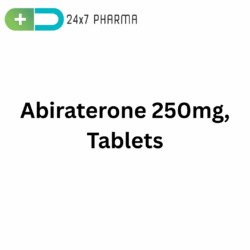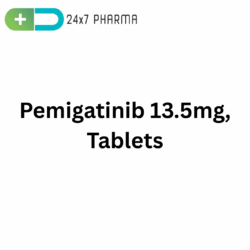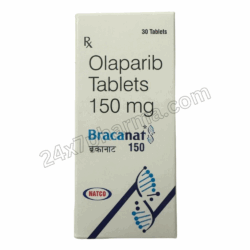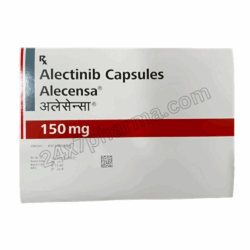Calupros 50mg, Bicalutamide Tablets
Calupros 50mg contains Bicalutamide, a non-steroidal anti-androgen medication used primarily in the treatment of prostate cancer. It works by blocking the action of male hormones (androgens) like testosterone, which fuels the growth of prostate cancer cells. Calupros is commonly used in combination with other therapies, such as luteinizing hormone-releasing hormone (LHRH) analogs.
What is Calupros 50mg?
Calupros 50mg is a prescription oral tablet that belongs to the class of anti-androgens. Bicalutamide, its active component, is mostly used to treat men’s localized or metastatic prostate cancer. It is often prescribed as a part of combination therapy or monotherapy depending on the stage and aggressiveness of the cancer.
- Drug Class: Non-steroidal Anti-androgens
- Form: Oral tablet
- Strength: 50 mg
- Brand Name Equivalents: Casodex, Calupros
How It Works / Mechanism of Action
Bicalutamide, the active ingredient in Calupros, works by:
- Binding to Androgen Receptors: It competes with androgens (like testosterone) for binding to androgen receptors in prostate cells.
- Blocking Hormone Action: Once bound, it inhibits the biological action of testosterone and dihydrotestosterone (DHT), two hormones that encourage prostate cancer cell growth.
- Cell Growth Suppression: As a result, the proliferation of prostate cancer cells is reduced, thereby slowing disease progression.
- Bicalutamide inhibits the effects of testosterone without lowering blood levels, in contrast to certain therapies that lower testosterone levels.
How to Use / Indications
Calupros 50mg is indicated for:
- Prostate cancer that has progressed (in conjunction with LHRH analogs)
- Locally advanced non-metastatic prostate cancer
- Monotherapy in some localized prostate cancers (in select patients)
- Flare protection during initial LHRH analog therapy
- It is most commonly used in androgen deprivation therapy (ADT) protocols, either as part of combined androgen blockade (CAB) or monotherapy depending on individual patient profiles.
How to Take / Dosage
The general dosage guidelines for Calupros 50mg are:
- Standard Adult Dose: One tablet (50 mg) taken once daily, usually at the same time every day.
- With or Without Food: It can be taken with or without food.
- Duration: Long-term use is common, depending on the cancer stage and response to treatment.
- It is crucial not to skip doses and not to stop the medication unless directed by the healthcare provider.
Other Dosages
While Calupros is commonly available in a 50 mg strength, Bicalutamide may also be available in 150 mg tablets in some formulations or countries, especially for monotherapy in localized prostate cancer (less common).
However, 50 mg daily is the most common and clinically preferred dose, especially in combination therapies.
Side Effects
Like all medications, Calupros 50mg may cause side effects. Common and serious adverse effects include:
Common Side Effects:
- Hot flashes
- Breast tenderness or enlargement (gynecomastia)
- Nausea
- Constipation or diarrhea
- Fatigue
- Dizziness
- Decreased libido
- Erectile dysfunction
Less Common but Serious Side Effects:
- Liver toxicity: Elevated liver enzymes, hepatitis, jaundice
- Interstitial lung disease (rare)
- Allergic reactions: Rash, itching, swelling
- Cardiovascular risks: Hypertension, chest pain (more in older adults)
- Anemia
- Patients must report any signs of jaundice, severe fatigue, breathing difficulty, or chest discomfort immediately.
Storage
To ensure effectiveness and safety:
- Store Calupros 50mg at room temperature (20°C to 25°C)
- Keep away from moisture, heat, and light
- Do not store in the bathroom
- Keep out of reach of children and pets
- Unused or expired medication should be disposed of properly as per local regulations.
Benefits
The use of Calupros 50mg in prostate cancer offers several significant benefits:
- Delays cancer progression
- Enhances survival rates when used with LHRH analogs
- Improves quality of life by managing symptoms associated with prostate cancer
- Non-invasive oral treatment compared to surgical castration
- Fewer hormonal side effects compared to other ADT options
- It can also be used as a preventive measure against tumor flare during initiation of LHRH agonist therapy.
Prescription
Calupros 50mg is a prescription-only medication. It must be prescribed by:
- Oncologists
- Urologists
- Cancer treatment specialists
Before starting therapy, the doctor may order liver function tests, PSA levels, testosterone levels, and conduct a thorough cancer staging. Ongoing monitoring is essential during therapy.
Interaction
Calupros can interact with several medications and substances, including:
Drug Interactions:
- Warfarin: Increases the anticoagulant effect; INR must be monitored
- Cytochrome P450 inducers/inhibitors: May affect Bicalutamide levels
- Anti-diabetic medications: Monitor for altered blood glucose control
- Other hormone therapies: Use with caution
- Food & Alcohol: Generally safe with food.
- Limit alcohol, especially if liver function is compromised.
- Always let your doctor know about all of your medications, including over-the-counter, prescription, and herbal items.
FAQs
Is Calupros chemotherapy?
No, it is hormonal therapy, not traditional chemotherapy. It works by blocking hormone activity rather than killing cells directly.
How long do I need to take Calupros?
Duration depends on cancer severity and treatment response—can be months to years.
Can I stop the tablet if I feel better?
No. Never stop without consulting your doctor, as prostate cancer can progress silently.
Conclusion
Calupros 50mg (Bicalutamide) is a pivotal medication in the management of advanced prostate cancer, especially as part of androgen deprivation therapy. Its oral administration, effective androgen receptor blockade, and ability to be used alongside LHRH analogs make it an essential component of modern prostate cancer treatment.
Patients taking Calupros should maintain regular follow-ups, monitor for side effects, and communicate openly with healthcare providers to ensure optimal outcomes and minimized risks. With proper use, Calupros can significantly improve the quality of life and prognosis in prostate cancer patients.

